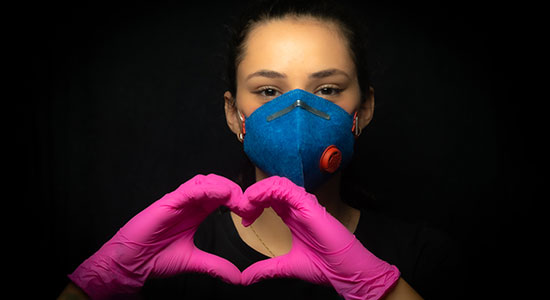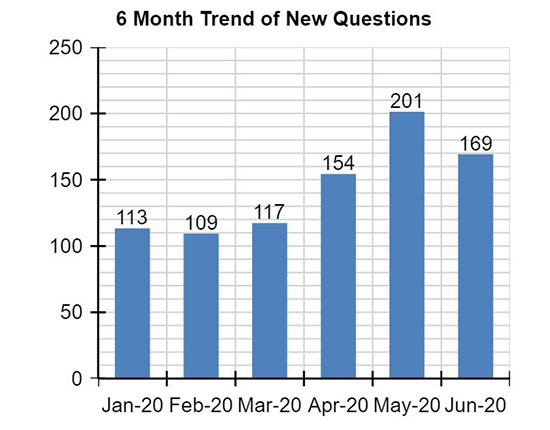
July 15, 2020 –The novel coronavirus pandemic has changed how we work and how we live. Most of those changes have not been welcome or positive. I want to focus here on one particular set of changes that have allowed lawyers and law students to respond to the changing civil legal needs of low income Wisconsin residents.
Lawyers are not typically thought of as first responders but this crisis has highlighted the essential nature of lawyers and pro bono service.
The Need
Along with this pandemic’s social and economic impacts are waves of legal issues – some new, but most are familiar.
 Jeff Brown, Harvard 1989, is manager of the State Bar Pro Bono Program, liaison to the Legal Assistance Committee, and staff for the Wisconsin Access to Justice Commission. He can be reached by email or by phone at (608) 250-6177.
Jeff Brown, Harvard 1989, is manager of the State Bar Pro Bono Program, liaison to the Legal Assistance Committee, and staff for the Wisconsin Access to Justice Commission. He can be reached by email or by phone at (608) 250-6177.
The loss of income means that individuals and small businesses are unable to pay their rent, mortgages, utilities, food, and other bills. Delays and denials in the state unemployment and national small business assistance programs made these problems worse.
Evictions, foreclosures, utility shut-offs, hunger and homelessness are the predictable result. Child placement arrangements and the ability to pay child support have been disrupted. Reports of domestic violence have increased. Increased hospitalizations, deaths, and disabilities create additional needs for legal assistance.
The challenges we face as a community are enormous and pro bono efforts will need to scale up to meet them.
According to the federal Legal Services Corporation’s (LSC) 2017 report, Documenting the Justice Gap in America, when low income Americans sought help at an LSC-funded legal aid office for a civil legal problem, they received inadequate or no legal assistance for 62 to 72 percent of those civil legal problems. The barriers to access to justice in Wisconsin are similarly documented in the State Bar’s civil legal needs study and subsequent research.
The unmet civil legal needs of low income and vulnerable residents has only increased as the economy has worsened. Regular avenues for obtaining help are out of reach or simply overwhelmed by the pandemic.1
Wisconsin has a vibrant pro bono network of programs at the state and local levels. But, like most law firms and courts, these volunteer programs were grounded in face-to-face interaction, so most had to shut down, at least temporarily, to stop the spread of COVID-19. After this pause, many pro bono efforts may look quite different.
‘Never Let a Good Crisis Go To Waste’
This quote has been popularized by Winston Churchill and Rahm Emmanuel, among others. The basic idea is that adversity presents an opportunity to innovate. It’s a chance to rethink how we live, work and relate to one another.
In the pro bono context, it pushes us to change how we look at volunteering, and seek out ways to reduce person to person contact while still fulfilling our mission. This reevaluation doesn’t necessarily mean that all pro bono service will be virtual for the duration of the pandemic. As noted in a recent InsideTrack article on Madison attorney Elisabeth Fletcher, not all pro bono service during the pandemic has been virtual. Still, this has been the dominant trend in Wisconsin and across the country.
Online Pro Bono Steps into the Gap
Pro bono projects that were already operating on a virtual basis saw no negative effects from the pandemic. Wisconsin Free Legal Answers (WFLA), for example, has always been an online legal clinic that uses volunteer attorneys to provide brief legal advice to clients through its website.
WFLA saw a significant rise in usage this spring as other options closed down and outreach increased. Lawyers who could not volunteer with their local clinic signed up with WFLA and helped handle the surge of questions there. Since March, WFLA volunteers have handled over 90 pandemic-related questions. The largest topic areas for those questions have been unemployment (35 percent), family (24 percent), employment (19 percent) and housing (14 percent).
The Appellate Practice Section’s online Appellate Help Desk project also suffered no ill effects during the pandemic. James Goldschmidt helps coordinate the project for the Appellate Practice Section and reports that “we have not seen a significant change in Appellate Help Desk activity since March. In terms of both volunteer staffing and the volume of incoming inquiries, the numbers look very much like they did at this time last year. I attribute that to the fact that the Help Desk has always been virtual: users submit requests by phone or email, and Google technology options allow volunteers to field inquiries remotely from wherever they may be working. If anything, I hope that attorneys who find themselves with extra down time will use the opportunity to give volunteering a try!”

Pro Bono Clinics Reinvented
So far, the Marquette Volunteer Legal Clinic, the Milwaukee Justice Center, the Eviction Defense Project, the Legal Clinic at Madison College, and others have been able to resume some operations by using remote video and teleconferencing services to assist clients.2
Volunteers at Foley & Lardner redesigned the Wisconsin Wills for Heroes project from an in-person basic estate-planning clinic to a virtual legal clinic model that achieves the same objective for first responders.
These efforts at pro bono transformation required significant advance planning, new administrative processes, retraining of volunteers and staff, new technology tools, and flexible volunteers.
To give you sense for how one pro bono project reinvented itself, let’s take a closer look at the effort to reopen one clinic. When the first stay-at-home orders were issued and courthouses closed, the Marquette Volunteer Legal Clinic and the Milwaukee Justice Center shut down. Clients and volunteers were redirected to online legal resources like Wisconsin Free Legal Answers.
When the decision was made to reopen as a virtual legal clinic, licenses for new software needed to be purchased, and law students and volunteers needed to be retrained. Clients also needed to be educated about how to use Zoom to participate in the clinic, so a bilingual instruction sheet was created.
Clients now call a special number to schedule an appointment with the clinic. A team of law students supervised by attorneys screen the requests to gather additional information and evaluate whether it would be helpful for the client to meet with an attorney. Information from the screening process is provided to the volunteer lawyer and law student to use when they log in to Zoom for the client’s appointment. The lawyer and law student work together with the client in a Zoom video or audio breakout session for up to an hour, and can use the substantive law resources in the clinic’s online “Gold Guides” as they work through the client’s issue. The law student then prepares a summary of follow-up actions for the client.
Clients receive a follow-up email containing notes about the visit and any documents that were completed during the session. Using this model, the clinic has been able to assist over 257 clients. That’s fewer than would have been assisted under normal circumstances, but each client was able to spend significantly more time with the volunteers. The clinic is now open every weekday.
Other projects followed a similar trajectory from shutdown to restart. Raphael Ramos, who directs the Eviction Defense Project at Legal Action of Wisconsin in Milwaukee reports that the project “just resumed operations with volunteers to provide remote representation through Zoom. Because we no longer have the luxury of meeting with clients in person on the day of their hearing, with easy access to their documents and court filings, we ask interested tenants to contact us as soon as possible before their proceeding so that we can obtain information and documents beforehand and prepare for the court date. We have trained our volunteers about defenses and have recordings available for them tied to the pandemic as well as technical assistance on the use of Zoom.”
Maggie Niebler-Brown, the Volunteer Lawyers project coordinator for Legal Action of Wisconsin, says that their unemployment and bankruptcy clinics have also resumed by telephone.
The shift has also extended to pro bono mediation efforts. According to Amy Kolz with the Metro Milwaukee Mediation Services “demand for eviction-prevention mediation quadrupled in June and is continuing on an upward trend so far in July.” Instead of in-person meetings and exchanging paper documents, the program uses a mix of old and new technology. Volunteer mediators arrange telephone consultations with the parties, document any agreement and prepare any stipulations for dismissal if the case is filed in court. When “wet” signatures are not required, mediators obtain them electronically using the Rsign service.
Lawyers and Law Firms Adapt
The pandemic pushed most lawyers to cut back or eliminate in-person volunteering, and to look for virtual volunteering opportunities. Although many virtual volunteering opportunities do involve providing brief service, the same tools can also be used for extended representation.3 Something is certainly lost without personal interactions, but one positive side effect of this shift is that virtual volunteering allows current volunteers to keep helping and lowers barriers to entry for new volunteers.
One semi-retired lawyer, Mike Tobin, described his volunteer experience this way: “I have enjoyed responding to questions on the ABA Free Answers site. Having more time at home (and fewer outside activities), I have tried to learn more about legal areas outside my expertise. For example, a question about an interstate custody issue had been unanswered for a couple of weeks. There was a website with great information that I was able to forward to the parent with the question.”
When the pandemic began, Jason Moore was already the most active volunteer on Wisconsin Free Legal Answers. He responded to more than 900 questions since August 2018, and more than 340 in 2020. But when a group of Marquette University Law School students reached out looking for a way to volunteer at a time when many in-person pro bono opportunities were not available, Jason agreed to supervise the law students as they researched and prepared draft answers for questions on Free Legal Answers. It allowed him to do even more pro bono work, and it gave law students a substantive way to assist over 90 people.
When asked how lawyers should approach volunteering during this pandemic, Tobin advised them to “look for new opportunities related to the COVID epidemic. Law school clinics and civil legal aid organizations may have greater demand for services. If you have resolved a COVID-related issue, maybe share tips and materials with the State Bar and pro bono organizations. Or post on your website, where maybe I'll find it!”
Law firms, such as Quarles & Brady, that had a well-developed pro bono culture and infrastructure before the pandemic were in a better position to take advantage of the changes. But it still required a considerable amount of work.
Mike Levey, the firm’s national pro bono partner summarized their efforts: “We've spent a fair amount of time over the past several months rethinking how we can deliver pro bono services – both now and going forward. With the pro bono clinics being closed due to the pandemic, and with many of our attorneys working remotely and not able to provide pro bono services in person, we were and are concerned with these additional challenges in delivering pro bono services. We reached out to several of our pro bono partner organizations – who we were already providing remote pro bono services – to see how we could expand our remote and virtual efforts. We also reached out to those organizations we partner with where pro bono services were previously being delivered in person to make them aware that we would be happy to become involved in any virtual pro bono clinics once they were up and operating and also to see if we could be a resource for them during the pandemic. We then reached out to all of our attorneys to encourage them to get involved in a remote pro bono opportunity.”
What’s Next?
The efforts to restart pro bono programs in Wisconsin have also been happening in other states. But given the scale of the need, it seems reasonable to ask, “What more can we do? What’s happening elsewhere that could inspire innovation in pro bono service?”
To ensure language access for clients who may speak only limited English, pro bono programs could explore the use of remote translation services offered by videoconferencing platforms like Zoom.4 Before the pandemic, a client who spoke only Spanish might only be able to get help on a specific day or at a particular location when a Spanish-speaking volunteer attorney was available. Remote translation helps break down that barrier for the client and the volunteer lawyer. Volunteers may then be able to help more people in more languages. Translators may become easier to recruit if they don’t have to physically travel to a clinic site.
With expanded use of technology-enabled pro bono services, we might be able to serve a variety of people who have not been able to fully access existing programs. Probono.net and the Immigration Advocates Network recently published a guide on how remote legal services tools are being used around the country to serve immigrants, caregivers, crime victims, and rural parents. These tools might also be used to make pro bono services more accessible to people with disabilities.
People in immigration detention are receiving assistance through the Remote Bond Pro Bono Project. Residents in a number of states can receive live remote help while browsing legal information websites through a technology that we have probably all encountered when browsing commercial websites: the chat function. The LiveHelp chat software built into these websites allows trained volunteers to guide users to the information that they are seeking on the site and answer basic questions.
The use of volunteers in the dispute resolution process is also ripe for innovation. Michigan’s MI-Resolve system brings online dispute resolution to the state court system. It blends automated dispute resolution techniques with volunteer mediators who are ready to assist the parties if the parties are unable to resolve their dispute using the online system.
Training is also a challenge. It’s unclear when it will be safe to gather hundreds of volunteers in a room for a day of training, so the live training approach needs to be reimagined. Can we offer training remotely and build libraries of resources designed for volunteer attorneys and law students?
The Wisconsin Access to Justice Commission recently partnered with Marquette Law School, Legal Action of Wisconsin, and Wisconsin Judicare to offer a four-part training program on unemployment benefits issues for volunteers. Massachusetts and Minnesota offer libraries of interview guides and checklists for volunteers. At the national level, the Practicing Law Institute is building a library of interactive training programs specifically for pro bono attorneys and offers free access to its programming for volunteer attorneys and legal aid staff.
Recruitment of volunteers and referral of cases to them are also undergoing changes that we can learn from. Massachusetts now has a COVID-19 pro-bono portal that will be useful for this and any future disaster and referral program.
Similar pro bono portals have been popping up all over the country, from statewide ones in Oklahoma and New York to small business clinics in Charleston, South Carolina. At the national level, the American Bar Association is also active. Discussions have already begun in Wisconsin about how to implement a similar solution here.
Overcoming the remaining access to justice challenges our legal system faces in the midst of this pandemic will not be easy. But bigger challenges have been overcome. With the right leadership, volunteers, and hard work, we can and should do more.
Endnotes
1 Evictions and requests for assistance to prevent evictions have risen at alarming rates in Wisconsin, reports Milwaukee Journal Sentinel on June 15, 2020.
2 The U.W. Law School Clinics have also reopened and have begun assisting Wisconsin residents with a variety of legal issues. But since those clinics are staffed by students who are working for credit, they are slightly different than the main topic of this article. Mitch, who directs the Economic Justice Institute at U.W. Law School reports that students have been trained on how to assist clients using remote access tools and that one positive of this approach is that they are able to help people who are further away than the typical client they would see in person.
3 The U.S. District Court for the Western District of Wisconsin website, for example, lists current cases that need pro bono counsel. With more lawyers working from home and most state and federal courts and administrative agencies using technologies that minimize in person contact, these may effectively become remote volunteer opportunities during the pandemic.
4 As Carmel Capati, manager for the Wisconsin Court Interpreter Program recently noted about Zoom’s interpreter function, "It's not perfect, and we still have some work to do, but it's already made a huge impact."
